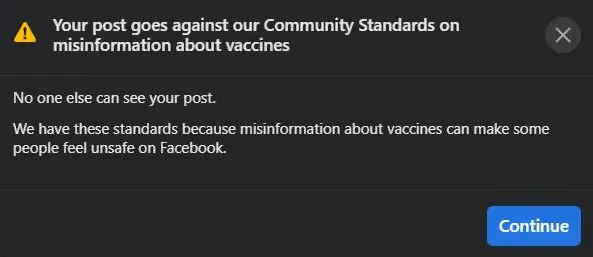Facebook Works to Deliver Us From Truth
By Thorsteinn Siglaugsson
This morning, a friend published a short post on Facebook, drawing attention to how it seemed to him the company was not even bothering any more to refer to the so-called “independent fact-checkers” to justify their censorship. He had re-posted a clip where Fox reporter Tucker Carlson discussed the negative effectiveness of the Covid-19 vaccines, referring to peer-reviewed studies. The clip is available here.
No reference to the twenty-something undergrads at the censorship agencies, just this label:
How on earth can peer-reviewed results constitute “misinformation”? The peer review process isn’t perfect, far from it, but after all it is the accepted standard. The first conclusion therefore is that the word “misinformation” does not refer to misinformation any more, it simply refers to any information the censor wants suppressed. The word has become meaningless.
The action, then, is suppression of a certain kind of information, but what about the reason? The reason for suppressing uncomfortable information about Covid-19 vaccines is that seeing this information may “make some people feel unsafe”. What does this mean precisely?
There are at least two possibilities, and here I’m talking only about those who believe in the narrative. The first is that people may feel unsafe seeing evidence that contradicts what they’ve been told by the authorities, the mainstream media and the social media giants; the “safe and effective” mantra. Watching Tucker Carlson’s review of the evidence might make people feel unsafe, uncertain, sceptical towards the propaganda relentlessly pushed towards them; this is what happens when you discover you’ve been deceived by someone you trusted. You feel unsafe for you don’t know who to trust any more.
Secondly, people may feel unsafe because their worldview is being threatened, while they still cling to it with all their might. They still believe the lies; they have no doubts, but discovering how some other people do not share their view of the world makes them frightened. Perhaps they’ve taken part in ostracising others, ridiculing them, wishing them harm, fearing for themselves if the truth comes out. Perhaps they suspect, deep down, that they are being deceived, but fear the consequences of the full realisation.
They may even have been so thoroughly brainwashed that they actually believe young and healthy people, an age-group with a demonstrated Covid mortality rate on par with the flu, will drop like flies in case they get infected, like this unfortunate young woman, willing to risk her life to protect her ill-advised belief.
Notice the wording in Facebook’s label. It does not say the alleged “misinformation” will make people unsafe, it says it will make them feel unsafe. When your view of the world is threatened you may certainly feel unsafe, but that doesn’t mean you are any less safe than you were before.
If someone points out to you the bridge you cross every day, and have been assured is well built and robust, is rusting away and may collapse any day, you may feel unsafe in the way you will doubt some other things you’ve been led to believe by the same people who assured you of the safety of the bridge, but avoiding that bridge will surely make you safer in the future.
If you find out that a medication you’ve been led to believe is safe and effective actually isn’t, you may feel unsafe in the same way. But avoiding that medication will surely make you safer in the future.
Having to think may make you feel unsafe, but it will not make you unsafe. A true belief is the result of thinking; to arrive at the truth we must have all the relevant information we can come by, evaluate it and in the end come to an informed conclusion. It may not hold forever, new evidence may present itself, we may have to reconsider our conclusion.
This is the essence of science, the prerequisite of progress, and also the prequisite of making the best and safest decisions for ourselves.
Facebook’s aim is not to make their users safe. Their aim is to make them feel they are safe, to prevent them from discovering challenging information, prevent them from thinking. They are the apostles of a new god, and his followers do not ask him to deliver them from evil, they ask him to deliver them from truth.
*****
This article was published by Brownstone Institute and is reproduced with permission.
This article is courtesy of ThePricklyPear.org, an online voice for citizen journalists to express the principles of limited government and personal liberty to the public, to policy makers, and to political activists. Please visit ThePricklyPear.org for more great content.


